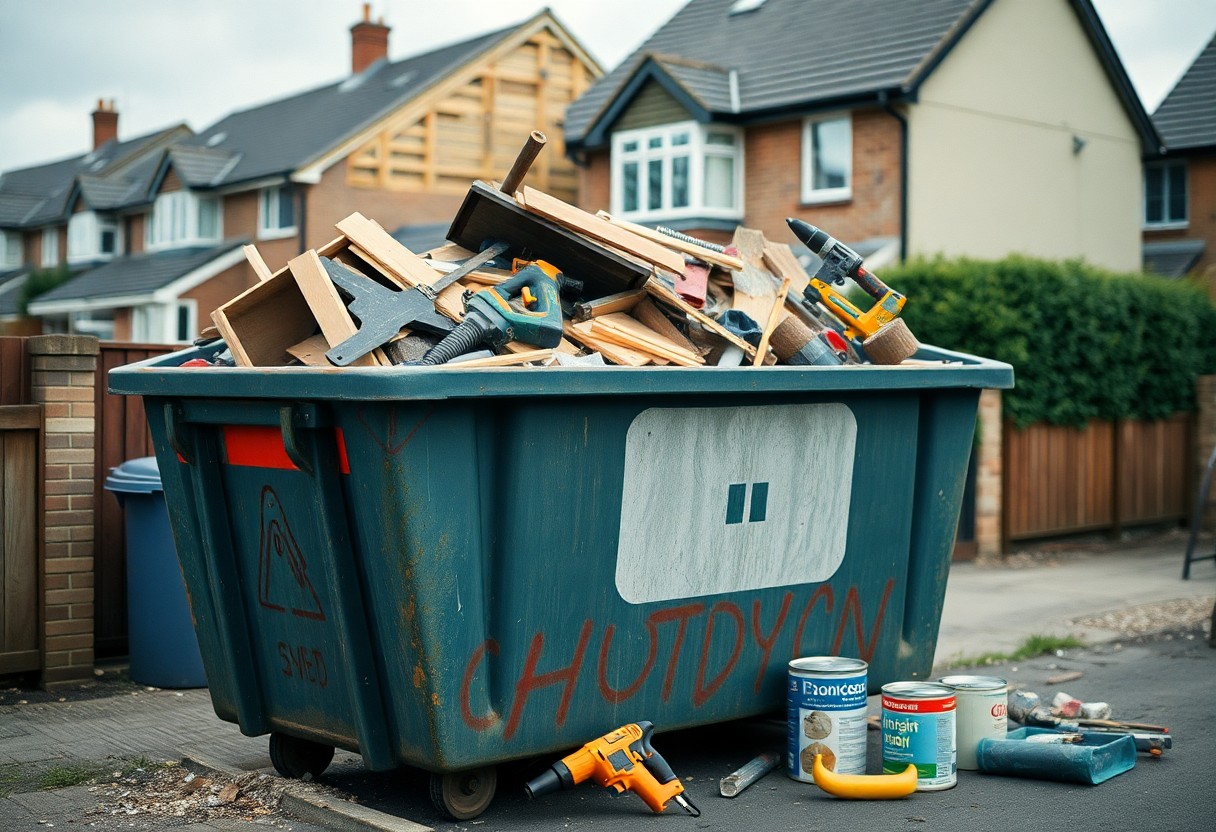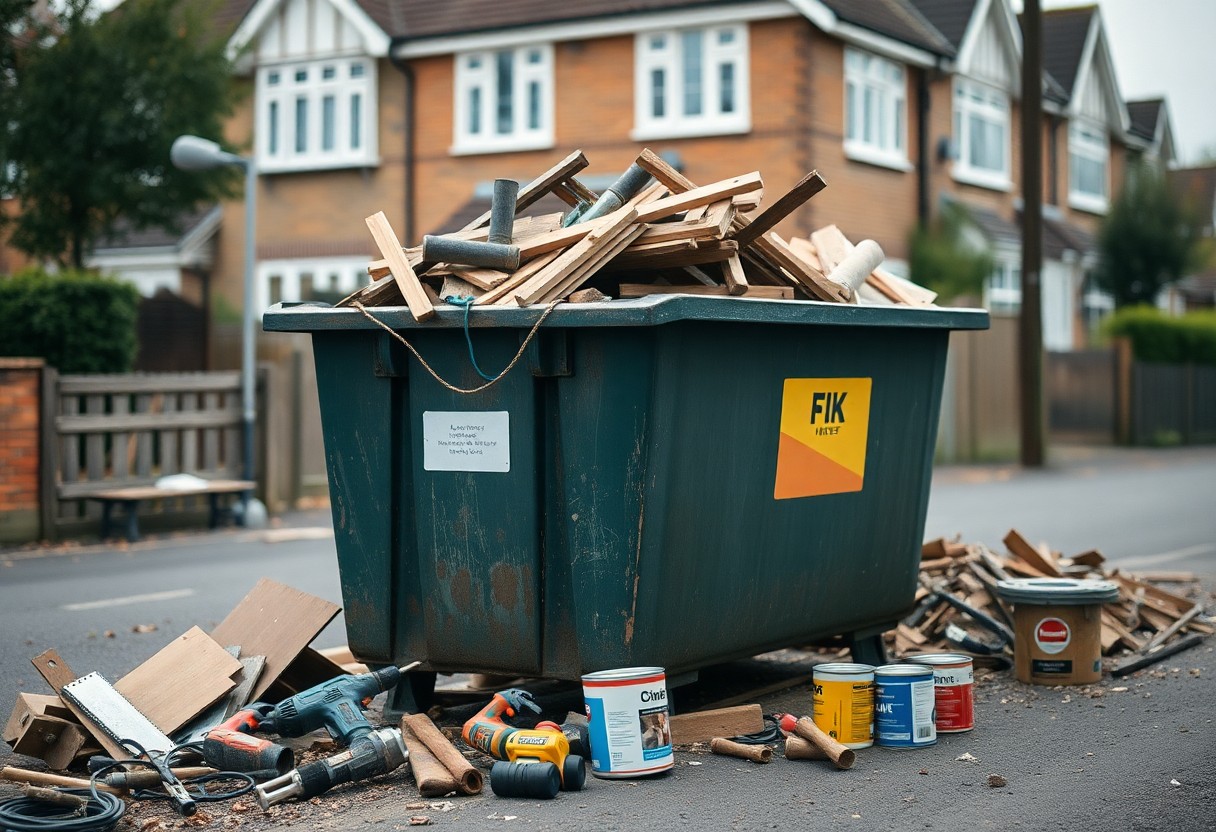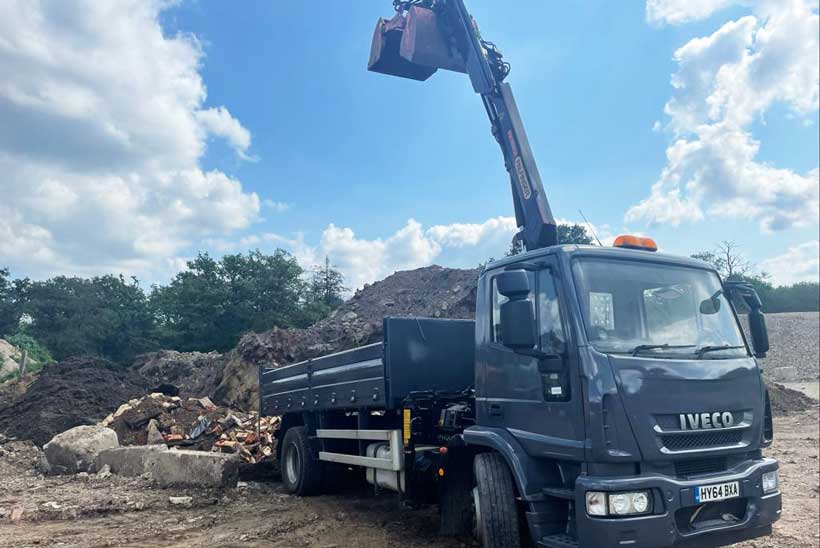Hire the perfect skip for your DIY projects in Surrey and take your home improvement experience to the next level. Understanding the different skip sizes and types available, along with local regulations, can save you both time and money. This guide will provide you with all the information you need to select the right skip, ensuring your waste disposal is handled efficiently and safely. Let’s probe the vitals that will make your DIY journey smoother.

Types of Skip Hire
Before deciding on the right skip for your project, it’s important to understand the different types of skip hire options available to you. Here’s a quick summary:
| Mini Skips | Ideal for small projects |
| Midi Skips | Suitable for medium-sized jobs |
| Maxi Skips | Best for larger projects |
| Roll-on Roll-off Skips | Perfect for commercial waste |
| Specialist Skips | For specific types of materials |
Recognising the right type of skip hire can streamline your DIY project. For further details, check this How Does Skip Hire Work? All You Need to Know.
Mini Skips
The mini skip is perfect for small-scale projects, such as minor garden clearances or home renovations. Typically holding around 2 cubic yards of waste, these skips are easy to manoeuvre and can fit in tighter spaces, making them an ideal choice for residential areas.
Midi Skips
Skips in the midi category generally hold about 4 to 5 cubic yards of waste. They are excellent for moderate projects, such as bathroom remodels or small building works. They’re spacious yet manageable, allowing you to dispose of a significant amount of waste without overcommitting.
Skip sizes in the midi range can often accommodate a fair amount of debris, making them a popular choice for both domestic and commercial use. You might find these invaluable if you’re tackling medium-scale renovations or extensive garden work.
Maxi Skips
Little often reflects the size of a skip, but maxi skips are far from small. Typically capable of holding an impressive 10 to 18 cubic yards, these skips are designed for larger projects, such as house clearances or extensive construction works.
Types of waste that often fill maxi skips include bulky items, construction debris, and large quantities of garden waste. Their substantial capacity means fewer collections are necessary, making them a practical choice for larger DIY jobs.
Roll-on Roll-off Skips
Types of roll-on roll-off skips are specialised containers capable of handling hefty loads, often ranging from 20 to 40 cubic yards. These skips are primarily used in commercial settings and for large-scale industrial projects, where managing large volumes of waste is necessary.
This type of skip can be particularly beneficial for construction sites and major renovations, as they can easily accommodate a wide variety of waste types, including heavier materials. Always ensure you check specific weight limits to avoid potential penalties or issues with your waste disposal process.
Key Factors to Consider
There’s a range of key factors you should consider when hiring a skip in Surrey. These include:
- Size requirements
- Waste types
- Duration of hire
- Local regulations
- Cost considerations
This careful consideration will ensure your DIY project runs smoothly.
Size Requirements
Factors like the scope of your project and the amount of waste generated play a significant role in determining the size requirements for skip hire. Make sure to assess how much waste you expect to dispose of, as skips come in various sizes ranging from small to large. This will help you avoid unnecessary costs associated with hiring an oversized skip or multiple smaller skips.
Waste Types
Factors such as the nature of the materials you plan to dispose of also influence your choice of skip, especially regarding waste types. Here’s a quick guide to the different waste categories:
| General Waste | Non-recyclable materials |
| Construction Debris | Building materials |
| Green Waste | Garden waste |
| Electrical Waste | Electrical items needing special handling |
| Hazardous Waste | Materials requiring careful disposal |
Recognising the type of waste you have ensures proper disposal and compliance with local regulations.
Duration of Hire
There’s flexibility in the duration of hire for skips, tailored to your specific project needs. Consider how long you will need the skip based on the volume of work and waste generation. A longer hire can provide added convenience, especially in larger projects.
Size your skip hire duration appropriately to prevent additional fees or delays. It’s always wise to communicate your expected timeline with the hire company, which helps in planning your project effectively.
Local Regulations
An understanding of local regulations is vital in the skip hire process. These can dictate where you can place your skip, whether on private property or public roads, and any permits that may be necessary.
A comprehensive knowledge of these regulations helps you avoid unnecessary fines or complications during your project. Always check with your local council to ensure compliance.

Tips for Choosing the Right Skip
Now, when selecting the right skip for your project, consider these key factors:
- Determine the size needed based on your project’s waste
- Look for reputable providers
- Understand rental duration and costs
To assist you further, check out Determining How To Hire The Right Kind of Skip. Knowing the specifics of your project will guide your choice effectively.
Assessing Your Waste
Even before you hire a skip, it’s important to assess your waste. Take stock of what you need to dispose of and sort it into categories like general waste, recyclables, or hazardous materials. This evaluation will help you select a skip that caters to your needs and complies with local regulations.
Budget Considerations
You should always take your budget into account when hiring a skip. Consider not just the hire cost but also potential additional fees, such as for prompt delivery or longer rental periods.
The costs can vary significantly between providers, so ensure you’re fully informed about what is included in the price. Check for any hidden charges that may arise, and confirm what payment methods are accepted to avoid unexpected surprises.
Comparing Providers
Even when looking for a skip hire service, comparing providers is important. Use the table below to weigh important aspects like cost and service quality.
| Provider | Cost/Service Quality |
|---|---|
| Provider A | £80 / High |
| Provider B | £60 / Medium |
With variations in prices and services, researching customer reviews can provide additional insights. Quality of service can significantly affect your overall experience, so take the time to read about other customers’ experiences.
Booking in Advance
Advance planning can streamline your project immensely. If you know your skip needs ahead of time, it’s wise to book it as early as possible.
Booking your skip in advance ensures you secure the right size and avoid delays in your project. It also allows for potential discounts or special offers that may be available for early reservations.
Step-by-Step Guide to Hiring a Skip
Many homeowners seek the convenience of skip hire to streamline their DIY projects. To simplify the process, follow these important steps:
| Step | Description |
| 1 | Research options available in your area. |
| 2 | Make the booking either online or via phone. |
| 3 | Arrange for delivery and placement of your skip. |
| 4 | Load your skip with waste materials. |
| 5 | Schedule the collection process. |
Researching Options
Some options for skip hire providers may vary significantly in terms of price, size, and availability. Start by searching online for local companies and reading customer reviews to gauge their reliability. Check if they offer the appropriate skip sizes suitable for your project, ensuring compliance with any council regulations.
Making the Booking
One effective way to make your booking is to contact skip hire companies directly. You can either call or book online to reserve your skip, providing relevant details about your project and the duration you’ll need the skip for.
Researching more about the company while you book can help you find the most suitable options. Be sure to ask about added fees, cancellation policies, and whether they require a permit for street placements. Ensure all details regarding the size and type of skip are confirmed during this step, as this will set the tone for the rest of your project.
Delivery and Placement
Options for skip delivery may differ among providers, but typically you can choose a date and timeframe that works for you. It’s important to inform the company of the best spot to place the skip, making sure it’s easily accessible.
Making the right choice for delivery and placement can significantly impact your productivity. Ensure there is enough space for the skip and that it doesn’t obstruct traffic or pedestrians. Clear any obstacles before arrival to facilitate a smooth delivery process.
Loading the Skip
Delivery of the skip is just the beginning; Loading it efficiently is vital to maximise space and avoid overcrowding. Adhere to guidelines about what can and cannot be placed inside.
This includes ensuring that you load heavier items first, followed by lighter materials. Avoid overfilling the skip for safety reasons, as this might lead to penalties. Also, be mindful of hazardous waste that requires specific handling regulations.
Collection Process
Any reputable skip hire service will provide a seamless collection process once you’ve completed loading. You’ll usually schedule a pick-up in advance, ensuring the waste is taken away efficiently.
For instance, communicate with your hire company regarding the best time for collection, and be sure the skip is easily accessible. If there is a large amount of waste or heavy materials, inform the company, as they may need special vehicles for collection. Proper organisation during this phase will contribute significantly to the ease of your project.
Pros and Cons of Skip Hire
To help you weigh your options, here’s a breakdown of the pros and cons of skip hire:
| Pros | Cons |
|---|---|
| Convenient waste disposal | Potential additional costs |
| Saves time on rubbish removal | Limited space at home |
| Available in various sizes | Permit required in some areas |
| Environmentally friendly | Noise and aesthetic concerns |
| Reduces risk of injury | Possible delays in pick-up |
If you are unsure about what size skip you need, consult our Size Guide for assistance.
Advantages of Using a Skip
Pros of skip hire include convenience and efficiency. By renting a skip, you can easily dispose of large amounts of waste without cluttering your home or garden. It saves you valuable time, enabling you to focus on your DIY project rather than worrying about rubbish removal.
Potential Drawbacks
There’s an aspect of skip hire that requires careful consideration. While it is a great solution for debris removal, there can be unexpected costs associated with permits and larger skip sizes. Additionally, placing a skip can block access or create an unsightly view, which might not be suitable for all neighbourhoods.
Understanding the regulations surrounding skip hire is crucial to avoid complications. You might face fines if the skip is placed on a public road without a permit, leading to unforeseen expenses. Moreover, if you underestimate the skip size, you risk incurring additional charges for excess waste. Always consider the logistics of skip placement and local rules to ensure a smooth experience.
Final Words
The Ultimate Guide to Skip Hire in Surrey for DIY Projects has equipped you with the necessary knowledge to select the right skip for your needs. By understanding your options, local regulations, and the importance of responsible waste disposal, you can confidently approach your DIY projects. With the right skip hire, you can ensure a smooth and efficient workflow, ultimately making your project a success while keeping your environment clean and organised.
FAQ
Q: What types of skips are available for hire in Surrey for DIY projects?
A: In Surrey, various types of skips are available for hire, catering to different DIY project needs. The most common types include mini skips (2 to 3 cubic yards), midi skips (4 to 5 cubic yards), and builders’ skips (6 to 8 cubic yards). Larger options, such as roll-on roll-off skips (up to 40 cubic yards), are also available for extensive projects. It is necessary to assess the quantity and type of waste you will be disposing of to choose the appropriate skip size.
Q: What can I put in a skip when hiring one for my DIY project?
A: When hiring a skip for a DIY project, you can dispose of a wide range of non-hazardous materials, including general household waste, garden waste, furniture, and construction debris such as bricks, plasterboard, and soil. However, certain items are prohibited, including hazardous waste (like chemicals and asbestos), electrical appliances, tyres, and batteries. Always check with your skip hire company for specific guidelines on what can and cannot be disposed of in the skip.
Q: How long can I keep the skip for my DIY project?
A: The duration for which you can keep a skip typically ranges from a few days to several weeks, depending on the skip hire company and your specific requirements. Most providers offer flexible hiring periods, but it’s advisable to specify your needs when booking. Extensions can often be arranged if you require the skip for a longer period, usually at an additional cost.
Q: Do I need a permit to place a skip on the road in Surrey?
A: Yes, if you plan to place a skip on a public road in Surrey, you will need to obtain a permit from your local council. This requirement ensures that the skip does not obstruct traffic or pedestrian pathways. Your skip hire company typically assists in securing the necessary permits, but it is wise to confirm this when making your booking.
Q: How much does skip hire cost in Surrey for my DIY project?
A: The cost of hiring a skip in Surrey can vary based on several factors, including the size of the skip, the duration of the hire, and any necessary permits. On average, you can expect to pay between £100 and £300. For mini skips, the costs are usually lower, while larger skips may incur higher charges. It is advisable to compare prices from different companies and check for any hidden fees before committing to a hire.



